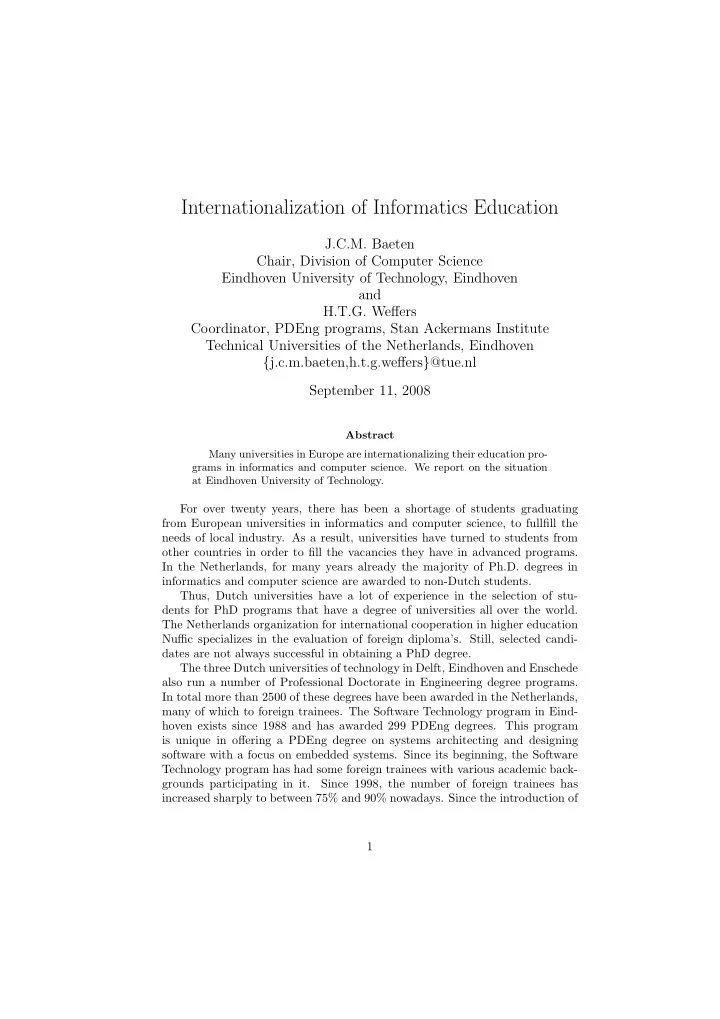

Internationalization of Informatics Education J.C.M. Baeten Chair, Division of Computer Science Eindhoven University of Technology, Eindhoven and H.T.G. Weffers Coordinator, PDEng programs, Stan Ackermans Institute Technical Universities of the Netherlands, Eindhoven { j.c.m.baeten,h.t.g.weffers } @tue.nl September 11, 2008 Abstract Many universities in Europe are internationalizing their education pro- grams in informatics and computer science. We report on the situation at Eindhoven University of Technology. For over twenty years, there has been a shortage of students graduating from European universities in informatics and computer science, to fullfill the needs of local industry. As a result, universities have turned to students from other countries in order to fill the vacancies they have in advanced programs. In the Netherlands, for many years already the majority of Ph.D. degrees in informatics and computer science are awarded to non-Dutch students. Thus, Dutch universities have a lot of experience in the selection of stu- dents for PhD programs that have a degree of universities all over the world. The Netherlands organization for international cooperation in higher education Nuffic specializes in the evaluation of foreign diploma’s. Still, selected candi- dates are not always successful in obtaining a PhD degree. The three Dutch universities of technology in Delft, Eindhoven and Enschede also run a number of Professional Doctorate in Engineering degree programs. In total more than 2500 of these degrees have been awarded in the Netherlands, many of which to foreign trainees. The Software Technology program in Eind- hoven exists since 1988 and has awarded 299 PDEng degrees. This program is unique in offering a PDEng degree on systems architecting and designing software with a focus on embedded systems. Since its beginning, the Software Technology program has had some foreign trainees with various academic back- grounds participating in it. Since 1998, the number of foreign trainees has increased sharply to between 75% and 90% nowadays. Since the introduction of 1
the Bachelor/Master system in Europe, many of these foreign trainees have (the equivalence of) an accredited Master’s level degree from a European university. In the Bologna process, Dutch universities have changed their five-year pro- grams in informatics and computer science into a three-year Bachelor program followed by a two-year Master program (in most cases, but also one one-year Master program exists). This made it possible to admit students with a Bache- lor degree from another university into the Master program. Many Dutch uni- versities offer programs in English, and want to attract international students. Eindhoven University of Technology (TU/e) quickly decided to offer all its Mas- ter programs in English. Motivation for this step is two-fold: most important is a shortage of master graduates for local industry, but also a wish to offer all students an international environment, since also the receiving industries are becoming international rapidly. It takes a lot of time to build a reputation all over the world as a university that is attractive for international students. Moreover, competition between universities for these international students has increased sharply, with US uni- versities still taking the largest share. Many universities in the developed world set up relationships with the top universities in the developing world. Also, selection in received applications is difficult. This has led Eindhoven University of Technology to work with preferred partners, selected universities in selected countries with an assured quality of students. For the Master program in Computer Science and Engineering, co- operation was sought in India, because this country has built a reputation in the area of software development, and many companies have outsourced part of their software development to it. In the summer of 2005, a delegation of TU/e visited Bangalore, Hyderabad and a couple of other places in India, and visited leading universities there. Host was Philips Bangalore, in particular Philips Research in Bangalore. Contacts were made and talks initiated with some universities. The talks with Manipal University in Manipal, Karnataka (the state of which Bangalore is the capital) have born fruit: in August 2006, 8 students have started a dual degree pro- gram of the two universities. The first year 2006/2007 was taught in Manipal, the second year 2007/2008 in Eindhoven. On August 26, 2008, all 8 students have received two master diploma’s: an M.Sc. diploma in Computer Science & Engineering of TU/e and an M.Tech. diploma in Software Engineering of Manipal University. The joint program is fully sponsored by large companies in the Netherlands. Upon completing the program, students are committed to work for these companies for at least three years. Thus, the 8 students are joining Philips, Capgemini and Cordys shortly. In August 2007, a group of 13 students started the program, and in August 2008, 15 students will start. Numbers should not increase further. In this way, the companies obtain an inflow of highly qualified staff, who know both cultures, and this is important in the cooperation between the Netherlands and India. Manipal University sees the program as a confirma- tion of its status as a leading private university of technology in India, and wants to use the cooperation as a means to improve the quality of its programs 2
and staff. TU/e obtains an increased inflow in its master program and makes its student population more international. In this process, we have learned a lot about education in informatics and computer science in India. In the talk, we discuss the Indian educational sys- tem, similarities and differences of universities, students and teachers, cultural differences, and what we can learn from this. This can help other universities embarked on a program of internationalization. 3
Recommend
More recommend